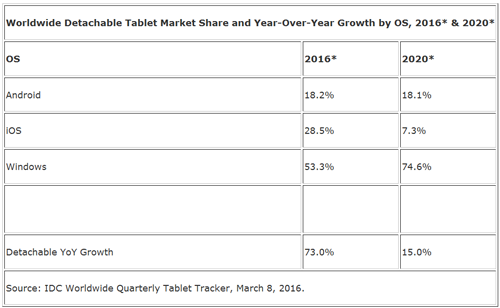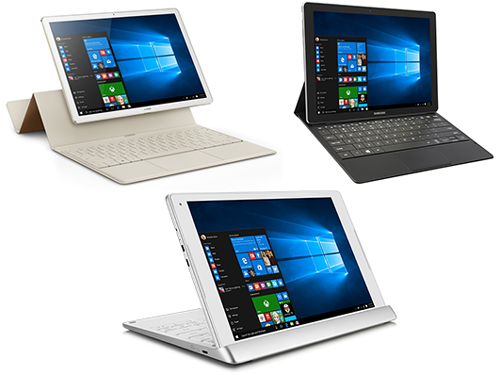News
IDC: Windows Will Own 'Detachables' Market Through 2020
- By Gladys Rama
- March 09, 2016
The transition away from traditional slate tablets like the iPad and toward "detachable" tablets like the Surface will soon translate into a significant market win for Microsoft.
That's the upshot of data released Tuesday by research firm IDC, which has been tracking these dual shifts in the tablet market for several quarters now. In its newest forecast, IDC says that while it expects overall tablet shipments to decline by nearly 6 percent in 2016, strong growth in the detachables segment will help keep the market afloat in the years to come. In fact, IDC projects shipments of detachables will surge from 16.6 million in 2015 to to 63.8 million in 2020.
According to IDC, the biggest beneficiary of this boom will be Microsoft, which was first to the detachables market in 2012 with the launch of the Surface. Windows devices are projected to capture 53 percent of the detachables segment by the end of 2016, ballooning to 75 percent by 2020.
In that same period, IDC expects iOS' share of detachables to fall from 29 percent to 7 percent, and Android's share to remain steady at 18 percent.
 [Click on image for larger view.]
[Click on image for larger view.]
Microsoft's dominance in the relatively new detachables segment marks "the first significant impact of Windows-based devices that the tablet market has seen," said Ryan Reith, program director with IDC's Worldwide Quarterly Mobile Device Trackers, in a prepared statement.
Until now, Microsoft has struggled to gain a foothold in the tablet market, or in any mobile device category, for that matter. The tablet category has generally been a two-horse race between Android and iOS, while the smartphone category is overwhelmingly Android's. However, the detachables segment has been largely Microsoft's domain -- until very recently. In late 2015, closely coinciding with the release of the Surface Pro 4, a raft of Surface lookalikes by Windows OEMs, as well as Apple and Google, entered the market (see "Microsoft Surface Competitors Crowd the Market").
February's Mobile World Congress event introduced even more detachables from the likes of Huawei, Alcatel and Samsung (see below).
 Clockwise from top-left: Huawei MateBook, Samsung Galaxy TabPro S, Alcatel Plus 10.
Clockwise from top-left: Huawei MateBook, Samsung Galaxy TabPro S, Alcatel Plus 10.
"Beyond the growing demand for detachable devices, we're also witnessing an increase in competition within this segment that will help drive design, innovation, and a decline in average prices," said IDC research director Jean Philippe Bouchard. "Everyone in the industry recognizes that traditional personal computers like desktops and notebooks will potentially be replaced by detachables in the coming years and this is why we will see a lot of new products being introduced this year."
Competition aside, IDC still expects Microsoft to benefit from demand for larger, not smaller, devices -- what Reith described as a "momentous shift in form factor."
"Windows 10 seems to be making headway in both the PC and tablet markets, mainly driven by devices with larger screen sizes. Despite the free licensing on products under 9 inches the growth for Windows-based tablets will be primarily on devices with displays between 9 and 13 inches," Reith said. "Until we see a day where touch is introduced for Mac OS X and inroads are paved to bring Android and Chrome more closely aligned, we believe Windows remains the logical choice for detachable products."